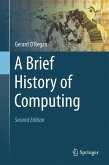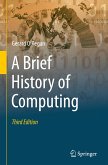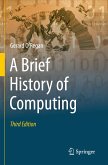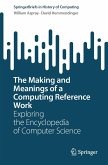This lively and fascinating text traces the key developments in computation from 3000 B.C. to the present day in an easy-to-follow and concise manner.
The book embarks upon a journey from ancient Egypt to modern times-- taking in mechanical calculators, early digital computers, to software engineering, to the first personal computers and mobile phones, and the invention of the World Wide Web, among other topics. This expanded and revised 4th edition examines legal and ethical issues that arise in the computing field, as well as innovations such as quantum computing and Bitcoin.
Topics and features:
Offers many pedagogical features such as chapter-opening key topics, chapter introductions and summaries, exercises, and a glossaryDiscusses major figures such as Boole, Babbage, Shannon, Turing, and Von NeumannReviews early computers developed in the United States, Germany and BritainExplores the development of the IBM 360 and the birth of the software industryReviews the history of software engineering, programming languages, and operating systems, and examines ethical software engineeringInvestigates progress of the field of artificial intelligence, including ethical AIReviews the introduction of the personal computer, the World Wide Web, mobile phone technology, and ethical social mediaDiscusses innovations such as Bitcoin, quantum computing and nanotechnologyExamines legal and ethical aspects of computing, computer crime and cybersecurity
This clearly written and broad-ranging text gives the reader a flavour of the history and stimulates further study in the subject. As such, it will be of benefit to students of computer science, while also capturing the interest of the more casual reader.
Dr. Gerard O'Regan is an independent researcher and visiting professor with research interests in software quality and software process improvement, mathematical approaches to software quality, and the history of computing. He is the author of several Springer books including Concise Guide to Software Engineering, Mathematical Foundations of Software Engineering, and Ethical and Legal Aspects of Computing.
The book embarks upon a journey from ancient Egypt to modern times-- taking in mechanical calculators, early digital computers, to software engineering, to the first personal computers and mobile phones, and the invention of the World Wide Web, among other topics. This expanded and revised 4th edition examines legal and ethical issues that arise in the computing field, as well as innovations such as quantum computing and Bitcoin.
Topics and features:
Offers many pedagogical features such as chapter-opening key topics, chapter introductions and summaries, exercises, and a glossaryDiscusses major figures such as Boole, Babbage, Shannon, Turing, and Von NeumannReviews early computers developed in the United States, Germany and BritainExplores the development of the IBM 360 and the birth of the software industryReviews the history of software engineering, programming languages, and operating systems, and examines ethical software engineeringInvestigates progress of the field of artificial intelligence, including ethical AIReviews the introduction of the personal computer, the World Wide Web, mobile phone technology, and ethical social mediaDiscusses innovations such as Bitcoin, quantum computing and nanotechnologyExamines legal and ethical aspects of computing, computer crime and cybersecurity
This clearly written and broad-ranging text gives the reader a flavour of the history and stimulates further study in the subject. As such, it will be of benefit to students of computer science, while also capturing the interest of the more casual reader.
Dr. Gerard O'Regan is an independent researcher and visiting professor with research interests in software quality and software process improvement, mathematical approaches to software quality, and the history of computing. He is the author of several Springer books including Concise Guide to Software Engineering, Mathematical Foundations of Software Engineering, and Ethical and Legal Aspects of Computing.
From the reviews of the second edition: "The book under review ... provides a succint (about 250 pages) reference book to computing topics (ranging from history to people to basic concepts). ... In its succint presentation the book has several strengths: It deals with pioneers (like Zuse) and historical issues ... . The book aims at the general reader or student with some general mathematical background knowledge and some experience with computers who needs a short offline encyclopedia." (Manuel Bremer, Zentralblatt MATH, Vol. 1244, 2012)








